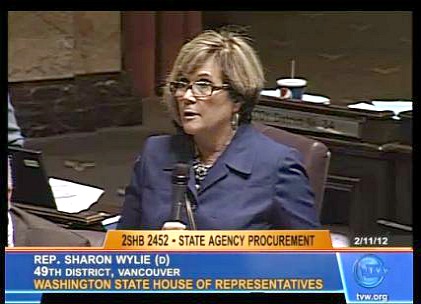OLYMPIA—With the cut-off day fast approaching, lawmakers are working long hours and even weekends to pass bills from the House to the Senate and vice-versa. This past Saturday, February 11, the House approved a measure that will help both big and small businesses better navigate through the state’s purchasing process.
Last year the Legislature passed laws to consolidate procurement functions from three separate entities, the General Administration, the Department of Information Services, and the Office of Financial Management, into one, the newly created Department of Enterprise Services (DES).
“The state spends more than $1 billion on goods and services every year, but our current procurement process is complicated,” Rep. Sharon Wylie explained on why her legislation, HB 2452, is necessary. “My bill follows up on the work we did last year to make it easier to do business with the state, while at the same time, saving the state millions of dollars.” 
Essentially, Wylie’s measure, which was a governor request, will reform, consolidate and streamline the state’s purchasing process by centralizing the authority and responsibility for the development, process, and oversight of state procurement of goods and services.
In her testimony before the House Ways and Means Committee, the Vancouver Democrat said that the Department of Enterprise Services is working hard to control the costs to implement the consolidation of purchasing into one chapter. She emphasized that the DES will provide training and information technology support to help agencies implement the bill. “The goal is to develop one training track, and my bill should help agencies achieve efficiencies and increase transparency, which will result in cost savings for the state.”
Under Wylie’s bill:
- The DES must adopt uniform policies and procedures for the effective and efficient management of contracts by all state agencies.
- Provide expertise and training on best practices for state procurement to state employees responsible for procurement.
- State agency employees responsible for procurement must complete the training or certification programs.
- The DES must develop a sweat-free procurement policy and code of conduct: all apparel, garments, accessories, equipment, materials, and supplies purchased by state agencies must be produced in workplaces free of sweatshop conditions.
- Use performance-based contracts that identify expected deliverables and performance measures or outcomes.
- Provide transparency: records related to state procurements are public records.
“My bill consolidates and streamlines the purchasing process, requires competition, provides a website with contract information, allows for electronic submittals, and requires training on best practices,” added Wylie. “It’s all about making government more efficient.”
The bill is on its way to the Senate for further consideration.
